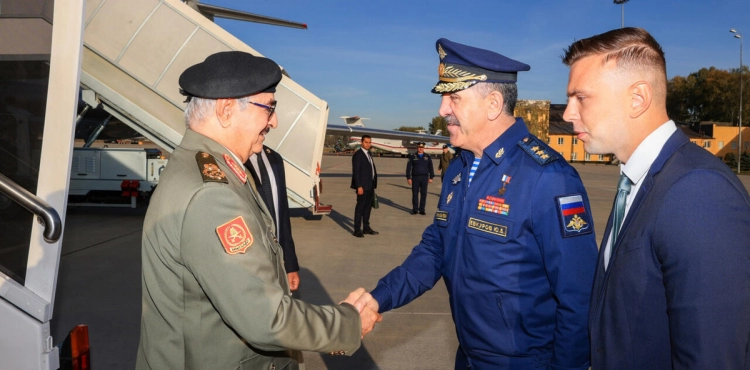Field Marshal Khalifa Haftar, the strongman in eastern Libya, arrived in Russia on Tuesday to discuss with Russian officials the situation in Libya and bilateral relations, according to what his forces announced.
Haftar was received by Russian Deputy Defense Minister Yunusbek Yevkirov, the former leader of the Muslim-majority Republic of Ingushetia.
Haftar's forces indicated on their Facebook page that the discussions will address "developments in the situation in Libya, bilateral relations between the two countries and ways to enhance and develop their support and issues of common interest."
Yevkirov has previously visited eastern Libya repeatedly to meet Haftar.
The last meeting between the two men dates back to September 17, and took place in Benghazi at the headquarters of the General Command of the “Libyan Arab Armed Forces,” the forces loyal to Haftar, a few days after the floods that resulted in thousands of deaths and missing people in eastern Libya.
For several years, Russia has been making diplomatic efforts in Africa to replace traditional Western powers.
Russia, which faces isolation on the international scene and is searching for allies, has redoubled its efforts in this regard since its attack on Ukraine in February 2022.
Moscow maintains close relations with Field Marshal Haftar, who resorted to Wagner Group mercenaries in his failed attempt to control Tripoli between April 2019 and June 2020.
This failure was followed in October 2020 by a truce agreement, the commitment of which was supervised by a military committee composed of five representatives from each camp.
Since then, hundreds of Wagner members have been active in the east, in the oil refinery area, and in southern Libya, after some of the group went to Mali or to Ukraine to fight alongside Russian forces.
After the 2011 revolution, which was supported by NATO, overthrew the regime of Muammar Gaddafi, Libya was plunged into conflicts that divided it. Its affairs are handled by two governments, one of which is internationally recognized and headquartered in Tripoli, where the Attorney General is based, and the other is in the east, which was hit by floods.












